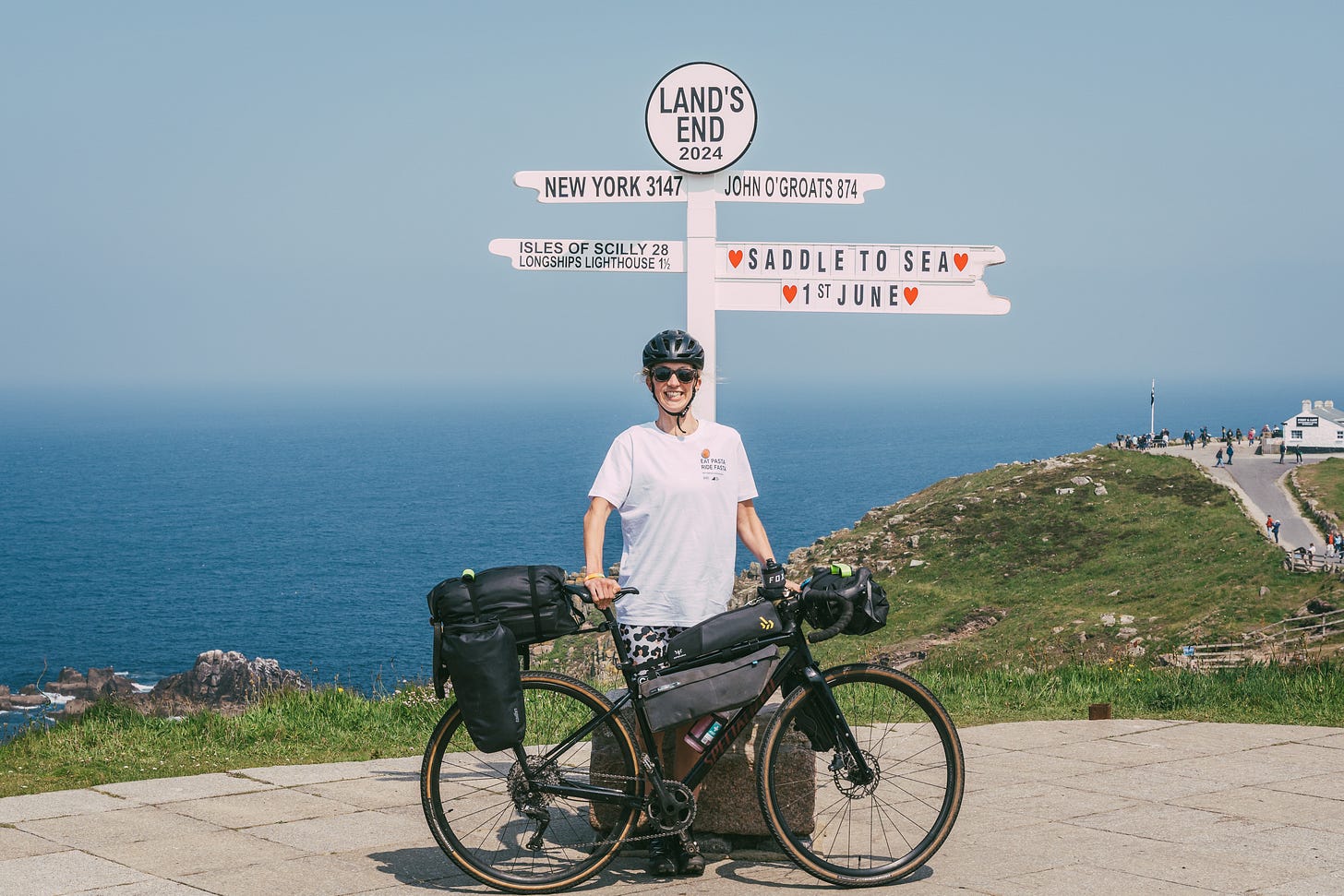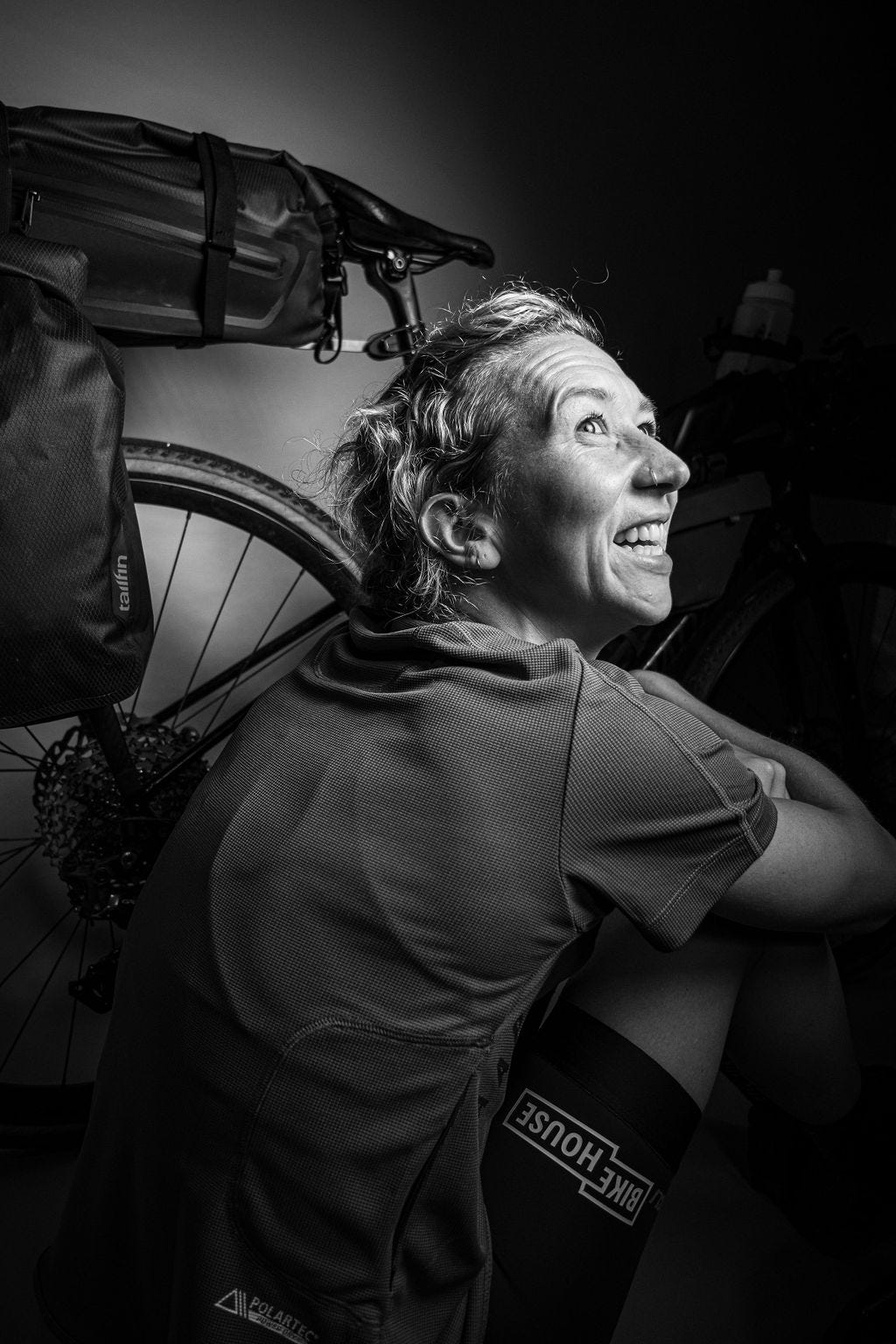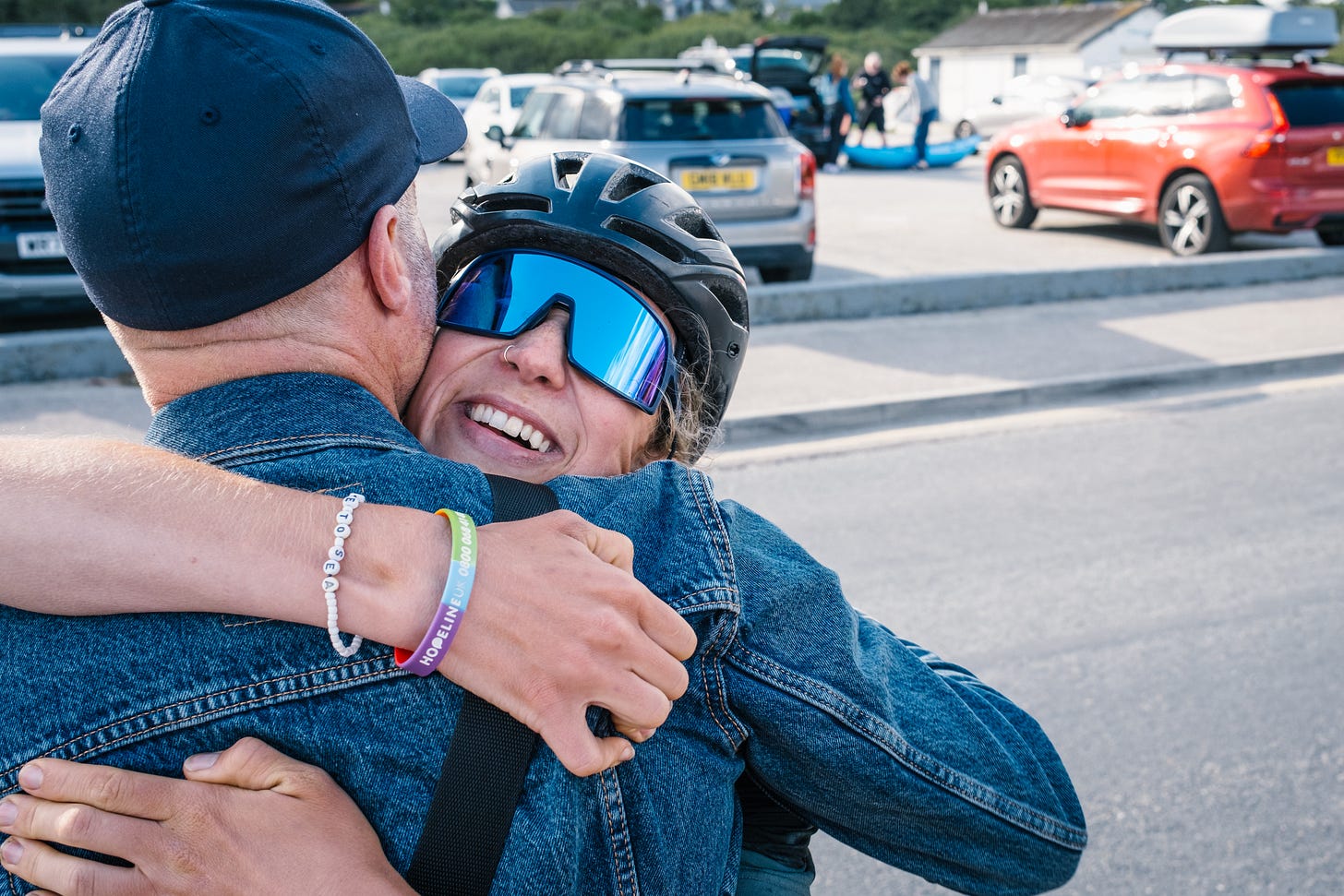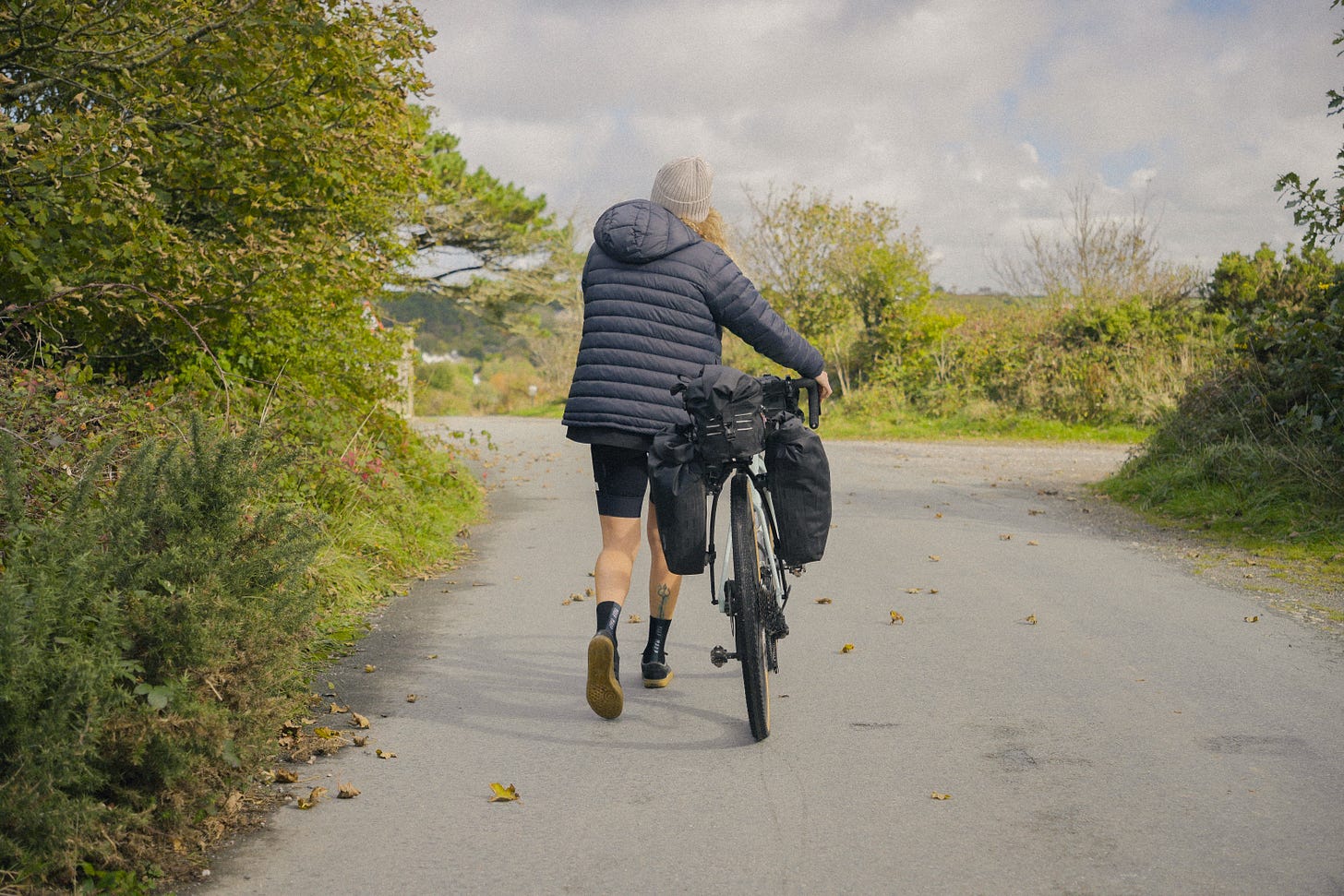Katy Roberts: Why I quit my job and cycled the UK coastline
How one woman quit her job and packed her life into panniers to raise awareness of suicide
Note: Contains references to suicide. (Photo credits: Katy Roberts)
Katy Roberts was just 17 when her father died by suicide.
“I just didn’t know what to do,” she says of that life-altering moment 18 years ago. “And a lot of my family couldn’t really talk about how he died, it was difficult. I suffered, I was in quite a dark place myself, and you’re just trying to survive. So I think when he died, I felt quite helpless.”
The only thing Roberts did know is that she wanted to do something in memory of him, “and I wanted it to be huge. I think that became a bit of a block for me because I was like nothing is ever going to be good enough.”
It would take her 17 years to find something big, and “good”, enough. So in the summer of 2024, age 34, she quit her job and cycled around Britain’s mainland coastline, covering 3,500 miles.
Haunting statistics
In Roberts’ local area of Cornwall, the suicide rate is higher than in other parts of the south-west and England, and her ride would be centred around helping those affected by suicide and fundraising for three charities: Cornwall Mind, Papyrus, and Sport In Mind.
She was inspired by the journey of Xani Byrne, who cycled the coast of the UK on a tandem – to fundraise for suicide charities – with people, including Roberts, joining him in the other saddle.
“It was one of the best conversations I’ve had in my whole life,” she recalls. “I never met anyone else who I could speak so freely with and it was the most cathartic, beautiful [conversation].”
She would go on to create her own version of the ride, incorporating her triathlon background and her passions for swimming and cycling, which her father had taught her when she was young.
“I was going to do John O’ Groats to Lands End – my mum did that years ago and I thought that would be a nice bit of mum and dad, but I love seeing the sea and I wanted to do the ride, wanted people to feel involved even if they didn’t have a bike,” she says.
So the challenge became a ride around the coast of the UK with added sea swimming and the invitation for others to join as they pleased.
“I wanted people to get involved because my big thing was getting outside; being in nature and moving is just so powerful for your mental health. There's a big waiting list for the NHS to help people with their mental health, so I was like if I can try and get people outside a bit more [it might help].”
After that, she quit her job.
“I think that was it for me, I always have crazy ideas, even with jobs and stuff I have ideas about what career I should go into, but I never actually get anything done. So that was a big deal for me when I handed my notice in and was basically committed to it.”
Life in panniers
On June 1, Roberts left Lands End with her life in panniers and headed up the west coast towards Wales, camping for the majority of the route. But before she’d even crossed the border, she had her first major challenge to contend with…
One evening Roberts was picked up for dinner and her bike was put in the back of a van. However, the doors weren’t closed properly – the bike rolled out and underneath the vehicle. That was the end of that.
“You could be so organised, but you just can't be prepared for what comes around the corner,” she says. “I remember looking at it and it was after my highest elevation day, so I was absolutely cooked, and I just remember… I couldn't quite compute. I was like, what?”
A new bike later, Wales would prove tough and provide many of the trip’s lows. “Sadly a lot of s— went down in Wales,” she says in reference to constant rain, running out of gas with no way to cook food, rural campsites with no shops nearby or places to refuel, and being blighted by a horse-fly bite.
“I was on antibiotics, I was like, this sucks, and then this lady messaged me saying, come into my surf shop. I wouldn't have done [usually], because at the beginning I was really just head down, just go, go, go. But because I had the horse-fly bite and I was told to rest, I met her and she gave me the biggest hug, gave me a free T-shirt, coffee, and she ended up joining me for a couple of days. I would never have had that connection if I hadn't slowed down.
“Just after that I got into my flow a little bit, got my gas and managed to catch up with things.”
By the time she arrived in northern Scotland, her ride had gathered interest and people – mostly strangers – were beginning to join her more often.
“At the beginning, I was having some beautiful conversations – stuff I'll remember for the rest of my life. I remember meeting this guy and he was like six foot eight, his hands the size of shovels, he was in Scotland and I was just like, s—-, what are we going to talk about? And we had the best day.
“We were racing each other and he was just awesome. And I found out he lost a friend to suicide. He was a farmer and he hadn't really opened up about it before. A lot of people were like, ‘I've never chatted about it’, which is exactly how I felt with Xani. So I was just like, this is great.”
Sights and human kindness
Roberts reflects on some of the things she learned from the trip, about herself, the country, and the beauty of the landscape. The sights and “human kindness” were some of her key takeaways.
“It seemed like some of the poorest places had the kindest people. I remember going to this pub and I felt really intimidated. It was a proper pub, pub and it was a lot of men and they were all looking at me. I sat outside and made friends with this old boy. He was tattooed and pretty scary, but he ended up donating some money to me and telling me about his struggles.”
The sheer amount of poverty and deprivation that Katy encountered across the UK is also something that she’ll never forget.
“It’s easy to live in a bubble and be unaware of it, or choose to avoid it. In Scotland, there were some areas that were pretty…” she trails off to find the right word. “Well, all over the country actually, and then I realised the suicide rate is quite high for those places.”
“I was having some beautiful conversations – stuff I'll remember for the rest of my life”
After a conversation with a man about being “soft” one day, she realised that perhaps it’s a good thing. “I am a bit soft and that's OK.
“You can do crazy challenges, but you can be emotional about it. It's a weird preconception that you've got to be really tough. I find it quite uncomfortable when people would say, ‘oh, that was so inspiring’. I'm glad if it helps someone get on a bike or get in the sea, that's really cool. But by no means was I a hard nut doing it. I'm crying all the time!”
Although the ride was an experience in travel and appreciating our natural landscapes, as well as a cycling adventure, the heart of it always came back to the cause of suicide and those affected by it.
“There was one moment I was so emotional from [looking at] the natural beauty of the Scottish Highlands. I started crying and it was a real bittersweet moment. I was like, our world is so beautiful and I want people to see this. People who are sad look at our world – it was one of those proper deep moments.”
By this point, slowed down by the horse-fly bite and having to find a replacement bike, she had learned that to enjoy it she needed to take a different approach than her usual race mindset in triathlon. “It was quite a good thing for me in life to be like ‘slow down’.” If not, she concedes, she would never have met some people, and “never have had these amazing connections with people.”
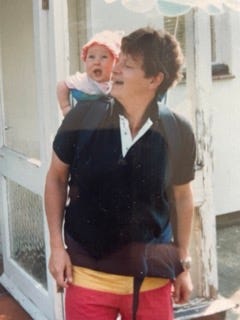
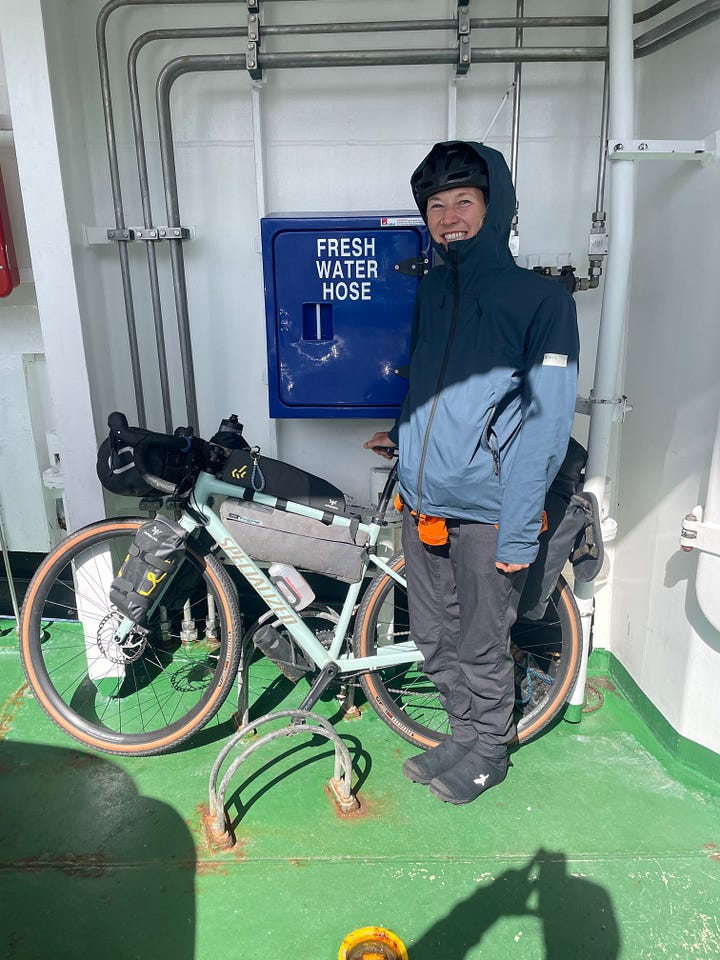
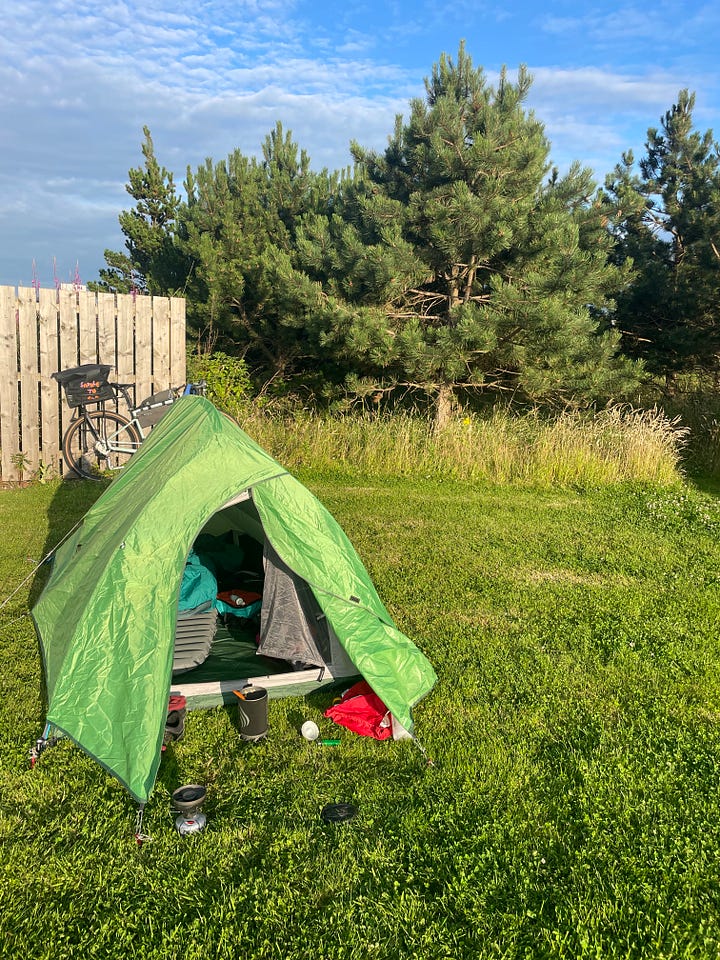
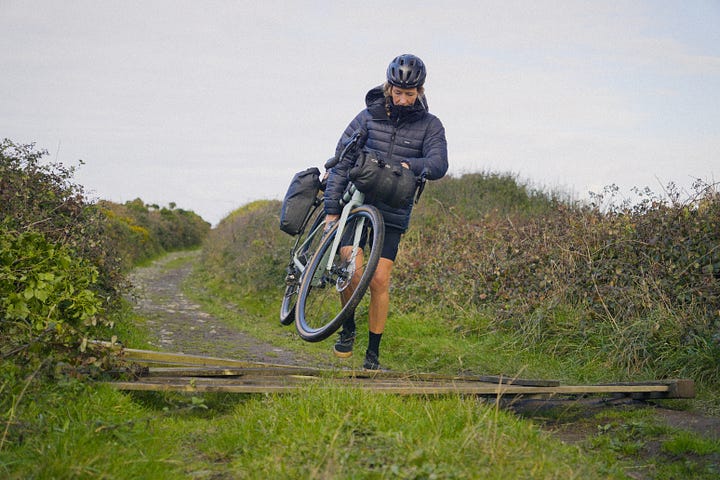
A freeing experience
When Roberts returned, she found making a cup of tea almost too easy. She missed having to work for it in getting the stove out, boiling the water, and wondering where to get a tea bag from.
“You enjoy it so much more when in [the process of] putting your tent up every day, you're building your home and you feel so good for doing that. Also, it [being outside] makes everything so simple. I think life can get so complicated, even choosing what to wear that day. You are just in the wild, real back to basics. And I think that that's just such a freeing, beautiful experience. Getting outside gets you out of your own head.”
When Roberts was younger, her family moved to Suffolk. Her father was into cycling, but later she noticed he wasn’t going out on his bike as much and he lost his community. “They are two big things I noticed that he lost. I think that had a big effect on him. So for me, it’s really important to keep those things.
“When I launched the ride and told people it was really hard. I felt like sometimes suicide tarnished my dad's name or took away from who he was because it took over. It was such a big thing. It upset me and I was a bit worried about my brother and sister, I just didn't want to bring it all up for them. It was like bearing your soul to everybody, and I felt it wasn’t my story to tell, it’s his.
“But I remember my sister saying to me, if you've helped one person by doing that, surely that's enough. Lo and behold, I had a message from a guy who said, ‘I just saw your picture of you and your dad. It really touched me. I've tried to take my life three times and I've got a little girl.’
“That made it like, right, that's why I'm doing this if I can help someone somewhere. And then he ended up joining me on my ride. So that was just a beautiful connection that I will cherish forever.”
What would her father think of the ride and her efforts for a prominent cause?
“I think realistically he'd be like ‘you are nuts’,” she says. “But he would be so pumped. I think he'd be really proud and totally sensible – don't quit your job silly, don’t camp on your own.
“And even though he'd be worried about me on the ride, he would know that it would be really good for me.”
Roberts returned to Lands End in late August after 78 days of cycling. Since then, she has shared her story and gone on to be trained in suicide prevention as part of Cornwall’s Orange Button scheme, a community mental health initiative.
Find out more about Katy’s chosen charities:
“I had a really good experience with Cornwall Mind. They met up with me and they gave me the time and invited me to work on some projects on how to help people who are left behind from suicide.
“We didn't get any help, me and my family, and there are lots out there - it's still happening where people aren't getting the help.”
On Papyrus, she says: “I think my dad would really be up for really supporting that. They have a 24 Hope line, which anyone can call at any time, any age, and they give tips, tricks and advice.
“If you want your business to be more mental health savvy and aware, then they can give you tips on that or if you're worried about a friend. So I just really wanted to raise awareness about that.”
Finally, Sport In Mind. Katy says: “I just feel that sport, or movement – because I know sport can scare people – movement's just so important. If they can help people who are struggling and maybe need that extra push, it can open so many doors.”
Read more adventure stories:
Mitch Hutchcraft: Chasing dreams to the top of the world
Sarah Kelly’s unrelenting season, and the Frog Graham Round.





